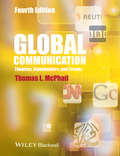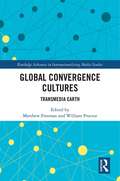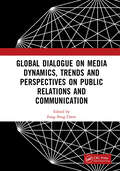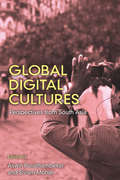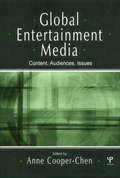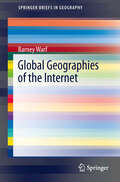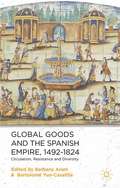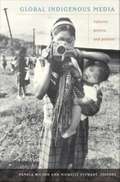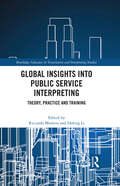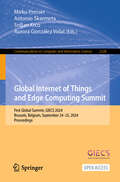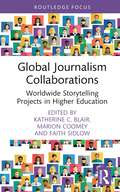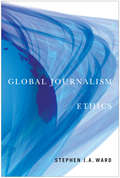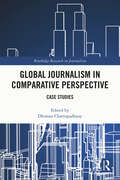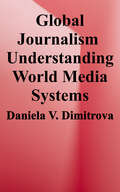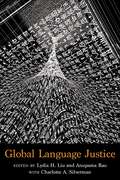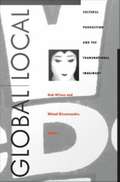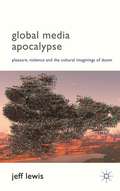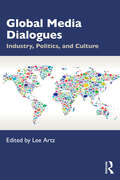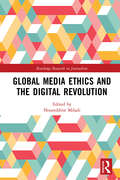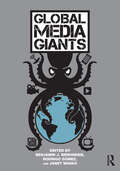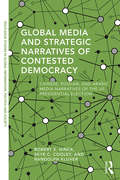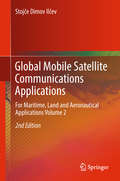- Table View
- List View
Global Communication: Theories, Stakeholders and Trends
by Thomas L. McPhailGlobal Communication is the most definitive text on multi-national communication and media conglomerates, exploring how global media influences both audiences and policy makers around the world. This new edition is comprehensively updated to reflect the many fast moving developments associated with this dynamic field. A new edition of the most definitive text on multi-national communication and media conglomerates, each chapter updated with extensive new details Covers the expanding area of global communication and describes major multimedia conglomerates, particularly in the USA, including the purchase of NBC-Universal by Comcast and Disney's expansion in China Includes new information on the phone hacking scandal by News Corporation’s employees in the UK Explains the significant changes in the communication industry both in the US and elsewhere Chronicles the continuing story of the development of Arab Media with new coverage on the Arab Spring Offers an updated companion website with instructor's manual, test banks and student activities, available upon publication at www.wiley.com/go/mcphail
Global Convergence Cultures: Transmedia Earth (Routledge Advances in Internationalizing Media Studies)
by William Proctor Matthew FreemanToday’s convergent media industries readily produce stories that span multiple media, telling the tales of superheroes across comics, film and television, inviting audiences to participate in the popular universes across cinema, novels, the Web, and more. This transmedia phenomenon may be a common strategy in Hollywood’s blockbuster fiction factory, tied up with digital marketing and fictional world-building, but transmediality is so much more than global movie franchises. Different cultures around the world are now making new and often far less commercial uses of transmediality, applying this phenomenon to the needs and structures of a nation and re-thinking it in the form of cultural, political and heritage projects. This book offers an exploration of these national and cultural systems of transmediality around the world, showing how national cultures – including politics, people, heritage, traditions, leisure and so on – are informing transmediality in different countries. The book spans four continents and twelve countries, looking across the UK, Spain, Portugal, France, Estonia, USA, Canada, Colombia, Brazil, Japan, India, and Russia.
Global Dialogue on Media Dynamics, Trends and Perspectives on Public Relations and Communication: Proceedings of the International Conference on Public Relations and Media Communication, (PRMC 2024), June 28-30, 2024, Beijing, China
by Fong Peng ChewThis book contains the proceedings of the International Conference on Public Relations and Media Communication (PRMC 2024) which explore the dynamic intersections of public relations and media in today’s rapidly evolving landscape. It has a repository of innovative research, insightful discussions, and emerging trends in digital media strategies, crisis communication, media ethics, public relations in the age of social media, and the impact of emerging technologies on media practices. It touches upon a wide array of topics and provides a comprehensive overview of the latest advancements and challenges in these fields. With innovative research contributions and case studies from around the world, this book will be instructive in shaping the way we look at the world of media and ourselves. This is a highly useful guide for university professors, research scholars, writers, journalists and media professionals who wish to stay updated on the recent shifts in public relations and media communication
Global Digital Cultures: Perspectives from South Asia
by Aswin Punathambekar Sriram MohanDigital media histories are part of a global network, and South Asia is a key nexus in shaping the trajectory of digital media in the twenty-first century. Digital platforms like Facebook, WhatsApp, and others are deeply embedded in the daily lives of millions of people around the world, shaping how people engage with others as kin, as citizens, and as consumers. Moving away from Anglo-American and strictly national frameworks, the essays in this book explore the intersections of local, national, regional, and global forces that shape contemporary digital culture(s) in regions like South Asia: the rise of digital and mobile media technologies, the ongoing transformation of established media industries, and emergent forms of digital media practice and use that are reconfiguring sociocultural, political, and economic terrains across the Indian subcontinent. From massive state-driven digital identity projects and YouTube censorship to Tinder and dating culture, from Twitter and primetime television to Facebook and political rumors, Global Digital Cultures focuses on enduring concerns of representation, identity, and power while grappling with algorithmic curation and data-driven processes of production, circulation, and consumption.
Global Entertainment Media: Content, Audiences, Issues (Routledge Communication Series)
by Anne Cooper-ChenGlobal Entertainment Media offers a unique perspective on entertainment media worldwide. As one of the first comprehensive books to address entertainment mass media worldwide, it addresses students as TV watchers and takes them to new places, both geographically and intellectually. Editor Anne Cooper-Chen has gathered an international group of scholars to explore such concepts as psychology, gratifications, and effects of media entertainment and its relation to national cultures, as well as to discuss the business of international TV trade by transnational media corporations.In this volume, experts discuss the content, audiences, and cultural and legal aspects of their respective countries, all of which are major TV markets. The country-specific chapters draw on the individual insights, expertise, and currency of 10 resident authors. Contributions represent every hemisphere of the globe, offering detailed examinations of media entertainment in United Kingdom, Germany, Egypt, Nigeria, South Africa, India, Japan, China, Brazil, and Mexico. The two concluding chapters provide cross-national case studies that look at familiar TV experiences--The Olympics and the "Who Wants to Be a Millionaire" show--in global and novel ways.Global Entertainment Media is intended for students in international media, comparative media, cross-cultural communication, and television studies, and it also has much to offer scholars and researchers in entertainment media.
Global Geographies of the Internet
by Barney WarfToday, roughly 2 billion people use the internet, and its applications have flourished in number and importance. This volume will examine the growth and geography of the internet from a political economy perspective. Its central motivation is to illustrate that cyberspace does not exist in some aspatial void, but is deeply rooted in national and local political and cultural contexts. Toward that end, it will invoke a few major theorists of cyberspace, but apply their perspectives in terms that are accessible to readers with no familiarity with them. Beyond summaries of the infrastructure that makes the internet possible and global distributions of users, it delves into issues such as the digital divide to emphasize the inequalities that accompany the growth of cyberspace. It also addresses internet censorship, e-commerce, and e-government, issues that have received remarkably little scholarly attention, particularly from a spatial perspective. Throughout, it demonstrates that in cyberspace, place matters, so that no comprehensive understanding of the internet can be achieved without considering how it is embedded within, and in turn changes, local institutional and political contexts. Thus the book rebuts simplistic "death of distance" views or those that assert there is, or can be, a "one-size-fits-all, cookie-cutter" model of the internet applicable to all times and places.
Global Goods and the Spanish Empire, 1492–1824
by Bartolomé Yun-Casalilla Bethany AramDrawing upon economic history, cultural studies, intellectual history and the history of science and medicine, this collection of case studies examines the transatlantic transfer and transformation of goods and ideas, with particular emphasis on their reception in Europe.
Global Indigenous Media: Cultures, Poetics, and Politics
by Pamela Wilson Michelle StewartIn this exciting interdisciplinary collection, scholars, activists, and media producers explore the emergence of Indigenous media: forms of media expression conceptualized, produced, and created by Indigenous peoples around the globe. Whether discussing Maori cinema in New Zealand or activist community radio in Colombia, the contributors describe how native peoples use both traditional and new media to combat discrimination, advocate for resources and rights, and preserve their cultures, languages, and aesthetic traditions. By representing themselves in a variety of media, Indigenous peoples are also challenging misleading mainstream and official state narratives, forging international solidarity movements, and bringing human rights violations to international attention. Global Indigenous Media addresses Indigenous self-representation across many media forms, including feature film, documentary, animation, video art, television and radio, the Internet, digital archiving, and journalism. The volume's sixteen essays reflect the dynamism of Indigenous media-making around the world. One contributor examines animated films for children produced by Indigenous-owned companies in the United States and Canada. Another explains how Indigenous media producers in Burma (Myanmar) work with NGOs and outsiders against the country's brutal regime. Still another considers how the Ticuna Indians of Brazil are positioning themselves in relation to the international community as they collaborate in creating a CD-ROM about Ticuna knowledge and rituals. In the volume's closing essay, Faye Ginsburg points out some of the problematic assumptions about globalization, media, and culture underlying the term "digital age" and claims that the age has arrived. Together the essays reveal the crucial role of Indigenous media in contemporary media at every level: local, regional, national, and international. Contributors: Lisa Brooten, Kathleen Buddle, Cache Collective, Michael Christie, Amalia Crdova, Galina Diatchkova, Priscila Faulhaber, Louis Forline, Jennifer Gauthier, Faye Ginsburg, Alexandra Halkin, Joanna Hearne, Ruth McElroy, Mario A. Murillo, Sari Pietikinen, Juan Francisco Salazar, Laurel Smith, Michelle Stewart, Pamela Wilson
Global Insights into Public Service Interpreting: Theory, Practice and Training (Routledge Advances in Translation and Interpreting Studies)
by Riccardo MorattoThis edited volume sets out to explore interdisciplinarity issues and strategies in Public Service Interpreting (PSI), focusing on theoretical issues, global practices, and education and training. Unlike other types of interpreting, PSI touches on the most private spheres of human life, making it all the more imperative for the service to move towards professionalization and for ad hoc training methods to be developed within higher institutions of education. PSI is a fast-developing area which will assume an increasingly important role in the spectrum of the language professions in the future. An international, dynamic and interdisciplinary exploration of matters related to PSI in various cultural contexts and different language combinations will provide valuable insights for anyone who wishes to have a better understanding when working as communities of practice. For this purpose, the Editors have collected contributions focusing on training, ethical issues, professional deontology, the role and responsibilities of interpreters, management and policy, as well as problems and strategies in different countries and regions. This collection will be a valuable reference for any student or academic working in interpreting, particularly those focusing on Public Service Interpreting anywhere in the world.
Global Internet of Things and Edge Computing Summit: First Global Summit, GIECS 2024, Brussels, Belgium, September 24–25, 2024, Proceedings (Communications in Computer and Information Science #2328)
by Antonio Skarmeta Srdjan Krco Mirko Presser Aurora González VidalThis Open Access book constitutes the proceedings from the First Global Internet of Things and Edge Computing Summit, GIECS 2024, held in September 24–25, 2024, in Brussels, Belgium. The 12 full papers presented here were carefully reviewed and selected from 21 submissions. These papers have been organized under the following topical sections: Industrial Internet of Things (IIoT) and Digital Twins; Data Management, Privacy, and Trust in Distributed Systems; Edge Computing and Cross-Domain Systems.
Global Journalism Collaborations: Worldwide Storytelling Projects in Higher Education (Routledge Focus on Journalism Studies)
by Katherine C. BlairGlobal Journalism Collaborations offers guidance on detailed ways to create collaborative international projects in the communications and journalism fields – a hot topic in higher education.The chapters are contributed by professors and journalists from around the world. The authors explain, step-by-step, the process of collaborating with students and instructors at universities in dozens of countries in order to produce digital storytelling projects that are streamed worldwide. The book will inspire academics and students in any discipline to develop and create their own collaborative projects by sharing lessons learned through case studies of successful global collaborations.This truly interdisciplinary work will interest scholars and instructors of journalism, media studies, mass communication, higher education and anyone working on collaborative projects across a variety of disciplines.
Global Journalism Ethics
by Stephen J.A. WardStephen Ward argues that present media practices are narrowly based within the borders of single country and thus unable to successfully inform the public about a globalized world. Presenting an ethical framework for work in multimedia, the author extends John Rawl's theories of justice and the human good to redefine the aims for which journalism should strive and then applies this new foundation to issues such as the roles of patriotism and objectivity in journalism. An innovative argument that presents a necessary corrective to contemporary media practices, Global Journalism Ethics is a theoretically rich study for journalists on the air, in print, and on the internet.
Global Journalism Ethics
by Stephen J.A. WardStephen Ward argues that present media practices are narrowly based within the borders of single country and thus unable to successfully inform the public about a globalized world. Presenting an ethical framework for work in multimedia, the author extends John Rawl's theories of justice and the human good to redefine the aims for which journalism should strive and then applies this new foundation to issues such as the roles of patriotism and objectivity in journalism. An innovative argument that presents a necessary corrective to contemporary media practices, Global Journalism Ethics is a theoretically rich study for journalists on the air, in print, and on the internet.
Global Journalism Practice and New Media Performance
by Jr Yusuf Kalyango David H MouldGlobal Journalism Practice and New Media Performance provides an overview of new and traditional media in their political, economic and cultural contexts while exploring the role of journalism practice and media education. The authors examine media systems in 16 countries, including China, Russia and the United States.
Global Journalism in Comparative Perspective: Case Studies (Routledge Research in Journalism)
by Dhiman ChattopadhyayThis book explores how journalism is practiced around the world and how there are multiple factors at the structural and contextual level shaping journalism practice. Drawing on case studies of how conflicts, pandemics, political developments, or human rights violations are covered in an online-first era, the volume analyzes how journalism is conducted as a process in different parts of the world and how such knowledge can benefit today's globally connected journalist. A global team of scholars and practicing journalists combine theoretical knowledge and empirically rich scholarship with real-life experiences and case studies to offer a storehouse of knowledge on key aspects of international journalism. Divided into four sections – journalistic autonomy, safety, and freedom; mis(information), crises, and trust; technology, news flow, and audiences; and diversity, marginalization, and journalism education – the volume examines both trends and patterns, as well as cultural and geographical uniqueness that distinguish journalism in different parts of the world. This volume will be of interest to students and scholars of journalism, media studies, and mass communication, as well as practicing journalists who want to report globally and anyone interested in gaining a foundational understanding of or researching journalism practices around the world.
Global Journalism: Understanding World Media Systems
by Daniela V. DimitrovaGlobal Journalism: Understanding World Media Systems provides a current and comprehensive overview of the key issues in global journalism in the digital age and traces how media systems have evolved over time in different world regions. With topics ranging from global media freedom and journalistic cultures to foreign news reporting and public diplomacy, conceptual content is presented in accessible style and supplemented by timely case studies.
Global Language Justice
by Liu, Lydia H.; Rao, AnupamaMore than 40 percent of the world’s estimated 7,100+ languages are in danger of disappearing by the end of this century. As with the decline of biodiversity, language loss has been attributed to environmental degradation, developmentalism, and the destruction of Indigenous communities. This book brings together leading experts and younger scholars across the humanities and social sciences to investigate what global language justice looks like in a time of climate crisis. Examining the worldwide loss of linguistic diversity, they develop a new conception of justice to safeguard marginalized languages.Global Language Justice explores the socioeconomic transformations that both accelerate the decline of minoritized languages and give rise to new possibilities through population movement, unexpected encounters, and technological change. It also critically examines the concepts that are typically deployed to defend linguistic diversity, including human rights, inclusiveness, and equality. Contributors take up topics such as mapping language communities in New York City or how Indigenous innovation challenges notions of linguistic purity. They demonstrate the need to reckon with linguistic diversity in order to achieve a sustainable global economic system and show how the concept of digital vitality can push language justice in new directions. Interspersed with their essays are multilingual works by world-renowned poets and artists that engage with and deepen the book’s themes. Integrating ambitious theoretical exploration with concrete solutions, Global Language Justice offers vital new perspectives on the place of linguistic diversity in ongoing ecological crises.
Global Local: Cultural Production and the Transnational Imaginary
by Wimal Dissanayake Rob WilsonThis groundbreaking collection focuses on what may be, for cultural studies, the most intriguing aspect of contemporary globalization--the ways in which the postnational restructuring of the world in an era of transnational capitalism has altered how we must think about cultural production. Mapping a "new world space" that is simultaneously more globalized and localized than before, these essays examine the dynamic between the movement of capital, images, and technologies without regard to national borders and the tendency toward fragmentation of the world into increasingly contentious enclaves of difference, ethnicity, and resistance. Ranging across issues involving film, literature, and theory, as well as history, politics, economics, sociology, and anthropology, these deeply interdisciplinary essays explore the interwoven forces of globalism and localism in a variety of cultural settings, with a particular emphasis on the Asia-Pacific region. Powerful readings of the new image culture, transnational film genre, and the politics of spectacle are offered as is a critique of globalization as the latest guise of colonization. Articles that unravel the complex links between the global and local in terms of the unfolding narrative of capital are joined by work that illuminates phenomena as diverse as "yellow cab" interracial sex in Japan, machinic desire in Robocop movies, and the Pacific Rim city. An interview with Fredric Jameson by Paik Nak-Chung on globalization and Pacific Rim responses is also featured, as is a critical afterword by Paul Bov. Positioned at the crossroads of an altered global terrain, this volume, the first of its kind, analyzes the evolving transnational imaginary--the full scope of contemporary cultural production by which national identities of political allegiance and economic regulation are being undone, and in which imagined communities are being reshaped at both the global and local levels of everyday existence.
Global Media Apocalypse
by Jeff LewisThe modern world seems trapped between fantasies of infinite pleasure and the prospects of total global catastrophe. Global Media Apocalypse explores these contrary imaginings through an evolving cultural ecology of violence. Articulated through the global media, these apocalyptic fantasies express a profoundly human condition of crisis.
Global Media Dialogues: Industry, Politics, and Culture
by Lee ArtzThis book, the first of its kind, brings together leading scholars from multiple perspectives in a serious dialogue about continuity and change in global media production and content. Looking at a wide swath of the world, these authors show the emergence of transnational collaboration in global television and film production across national borders that seem to transcend national cultures and identities. At the same time, traditional class analysis of such phenomena is reframed within the rise of myriad social movements for equality, democracy, human rights, and defense of the environment. What are the effects of media, local or global? Does the West continue to dominate or is cultural imperialism waning? With original chapters written by leading scholars from a variety of disciplines, this book will appeal to students and scholars interested in global media communication, cultural studies, and international political economy.
Global Media Dialogues: Industry, Politics, and Culture
by Lee ArtzThis book, the first of its kind, brings together leading scholars from multiple perspectives in a serious dialogue about continuity and change in global media production and content. Looking at a wide swath of the world, these authors show the emergence of transnational collaboration in global television and film production across national borders that seem to transcend national cultures and identities. At the same time, traditional class analysis of such phenomena is reframed within the rise of myriad social movements for equality, democracy, human rights, and defense of the environment. What are the effects of media, local or global? Does the West continue to dominate or is cultural imperialism waning? With original chapters written by leading scholars from a variety of disciplines, this book will appeal to students and scholars interested in global media communication, cultural studies, and international political economy.
Global Media Ethics and the Digital Revolution (Routledge Research in Journalism)
by Noureddine MiladiThis volume responds to the challenges posed by the rapid developments in satellite TV and digital technologies, addressing media ethics from a global perspective to discuss how we can understand journalism practice in its cultural contexts. An international team of contributors draw upon global and non-Western traditions to discuss the philosophical origins of ethics and the tension that exists between media institutions, the media market and political/ideological influencers. The chapters then unveil the discrepancies among international journalists in abiding by the ethics of the profession and the extent to which media ethics are understood and applied in their local context/environment. Arguing that the legitimacy of ethics comes not from the definition per se, but from the extent to which it leads to social good, the book posits this should be the media’s raison d'être to abide by globally accepted ethical norms in order to serve the common good. Taking a truly global approach to the question of media ethics, this volume will be an important resource for scholars and students of journalism, communication studies, media studies, sociology, politics and cultural studies.
Global Media Giants
by Janet Wasko Benjamin Birkinbine Rodrigo GomezGlobal Media Giants takes an in-depth look at how media corporate power works globally, regionally, and nationally, investigating the ways in which the largest and most powerful media corporations in the world wield power. Case studies examine not only some of the largest media corporations (News Corp., The Microsoft Corporation) in terms of revenues, but also media corporations that hold considerable power within national, regional, or geolinguistic contexts (Televisa, The Bertelsmann Group, Sony Corporation). Each chapter approaches a different corporation through the lens of economy, politics, and culture, giving students and scholars a thoughtful and data-driven guide with which to interrogate contemporary media industry power.
Global Media and Strategic Narratives of Contested Democracy: Chinese, Russian, and Arabic Media Narratives of the US Presidential Election (Routledge Studies in Global Information, Politics and Society)
by Robert S. Hinck Skye C. Cooley Randolph KluverIn order to better understand how the world viewed the US 2016 presidential election, the issues that mattered around the world, and how nations made sense of how their media systems constructed presentations of the presidential election, Robert S. Hinck, Skye C. Cooley, and Randolph Kluver examine global news narratives during the campaign and immediately afterwards. Analyzing 1,578 news stories from 62 sources within three regional media ecologies in China, Russia, and the Middle East, Hinck, Cooley, and Kluver demonstrate how the US election was incorporated into narrative constructions of the global order. They establish that the narratives told about the US election through national and regional media provide insights into how foreign nations construct US democracy, and reflect local understandings regarding the issues, and impacts, of US policy towards those nations. Avoiding jargon-laden prose, Global Media and Strategic Narratives of Contested Democracy is as accessible as it is wide-ranging. Its empirical detail will expand readers’ understanding of soft power as narrative articulations of foreign nation’s policies, values, and beliefs within localized media systems. Communication/media studies students, as well as political scientists whose studies includes media and global politics, will welcome its publication.
Global Mobile Satellite Communications Applications
by Stojče Dimov IlčevGlobal mobile satellite communications (GMSC) are specific satellite communication systems for maritime, land and aeronautical applications. It enables connections between moving objects such as ships, vehicles and aircrafts, and telecommunications subscribers through the medium of communications satellites, ground earth stations, PTT or other landline telecommunications providers. Mobile satellite communications and technology have been in use for over two decades. Its initial application is aimed at the maritime market for commercial and distress applications. In recent years, new developments and initiatives have resulted in land and aeronautical applications and the introduction of new satellite constellations in non-geostationary orbits such as Little and Big LEO configurations and hybrid satellite constellations as Ellipso Borealis and Concordia system. This book is important for modern shipping, truck, train and aeronautical societies because GMSC in the present millennium provides more effective business and trade, with emphasis on safety and commercial communications. Global Mobile Satellite Communications is written to make bridges between potential readers and current GMSC trends, mobile system concepts and network architecture using a simple mode of style with understandable technical information, characteristics, graphicons, illustrations and mathematics equations. Global Mobile Satellite Communications represents telecommunications technique and technology, which can be useful for all technical staff on vessels at sea and rivers, on all types of land vehicles, on planes, on off shore constructions and for everyone possessing satellite communications handset phones.
